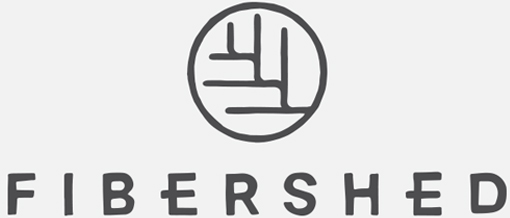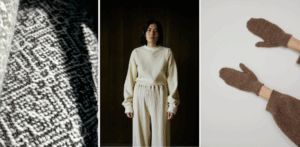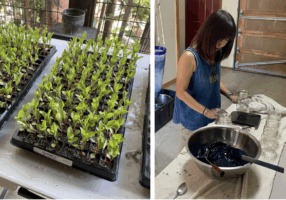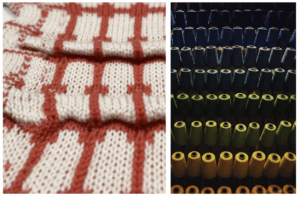Fibershed Gala: The Practice of Belonging
Saturday, September 28, 2019
Chileno Valley Ranch, Petaluma
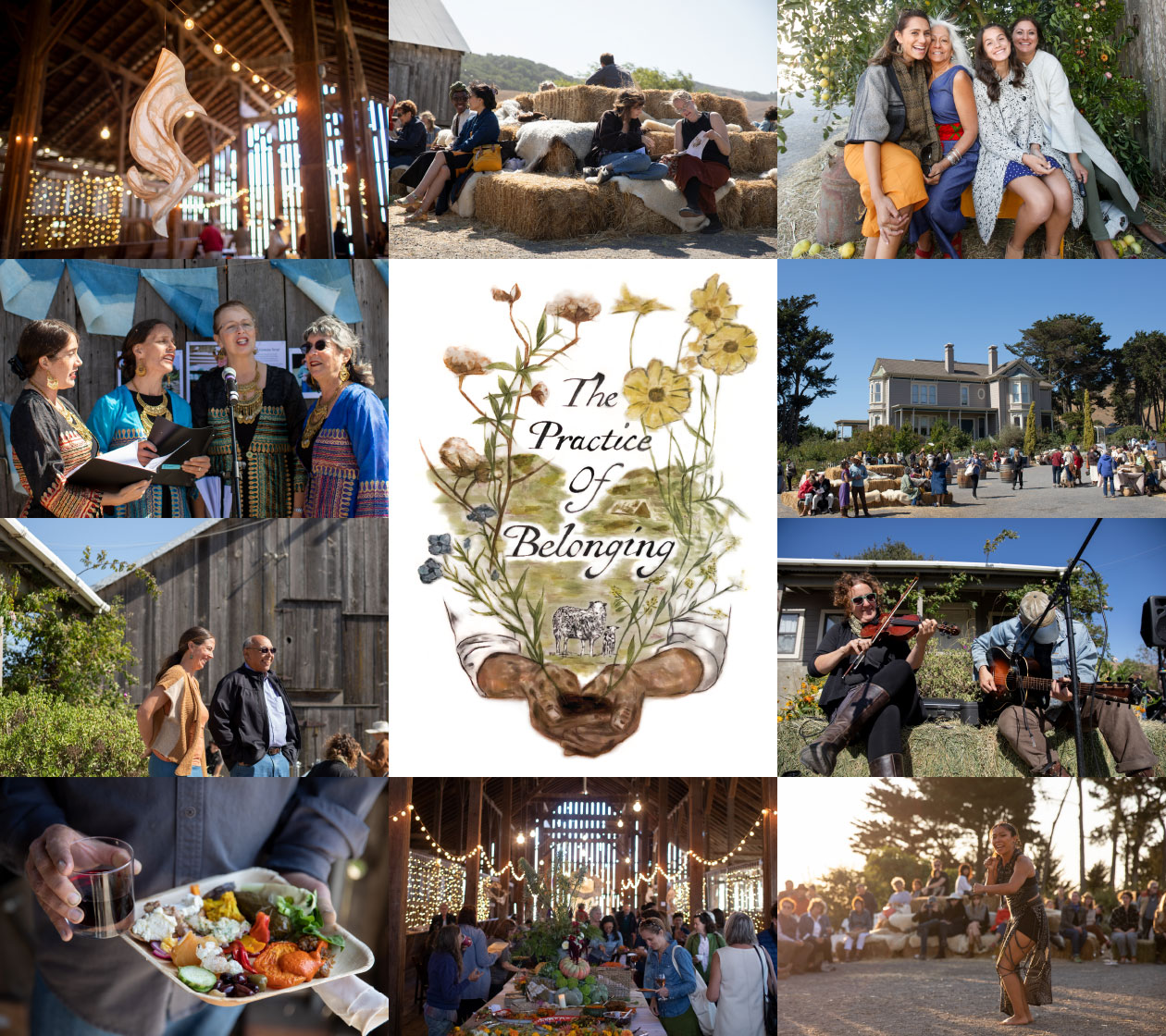
What we wear is layered with meaning: the materials are an expression of the carbon cycle itself and reconnect us to the landscape that provides our natural fiber and dye resources. From soil to skin, we cultivate our sense of belonging to our regional ecology, animals, and community through a textile culture.
The first Fibershed fashion show demonstrated the realization of a prototype 150-mile radius wardrobe; in this fifth fashion gala, we invited guests to participate directly in experiencing and co-creating local textile culture. In place of a runway, we rooted into a relationship with the soil to soil lifecycle, and celebrated the richness of local fiber, local dye, and local skill.
With atmospheric carbon levels at an all-time high, we engaged with personal practices of material stewardship and storytelling while deepening our understanding of the opportunities to ameliorate climate change within our bioregion.
Presented amidst the expansive views and fragrant gardens of Chileno Valley Ranch, a 150-year-old farmstead that is shifting its management of the landscape to enhance the drawdown of atmospheric carbon, we acknowledge that this event took place on the traditional and ancestral territory of the Southern Pomo and Coast Miwok peoples. The Fibershed Gala illuminated the pathways of participation in regional fiber and dye systems that restore our climate, working landscapes, and our relationships in the community.
Climate Beneficial Clothing
Clothing that transforms what we wear into a means of building soil and reversing climate change was displayed in a showcase of Climate Beneficial designs by Fashion Institute of Design design students.
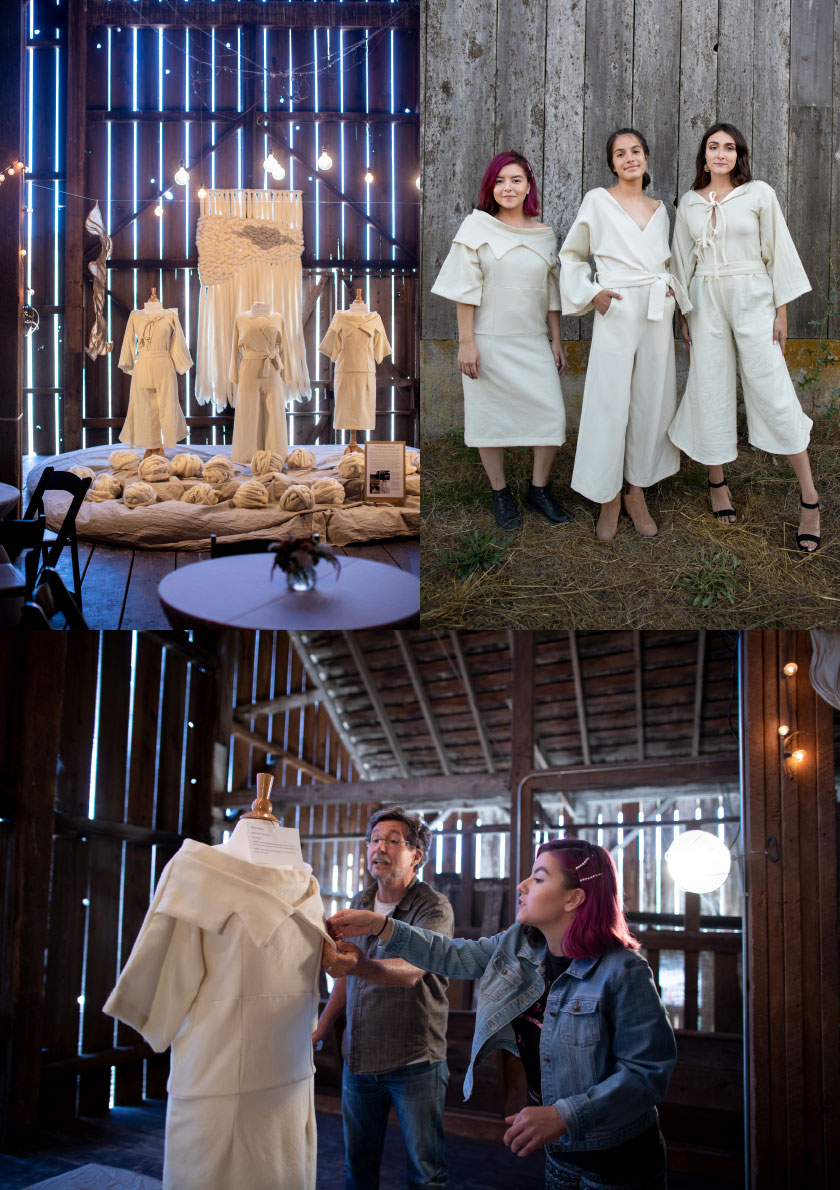
Knitalong
We joined in a shared exploration of locally farmed yarns and patterns for hand knitters with the launch of a new community knitalong. Click here to explore the 2019 Fibershed Knitalong patterns and additional opportunities to engage with regional yarns.
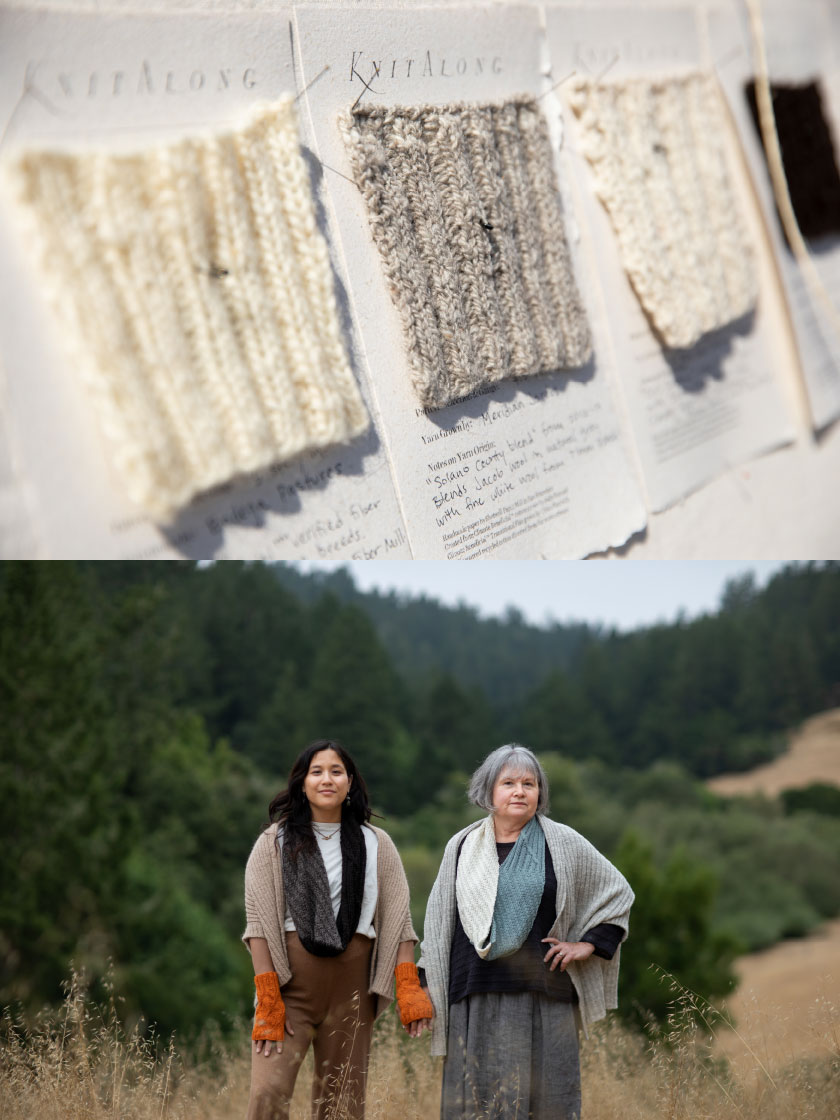
In/Visible Hands
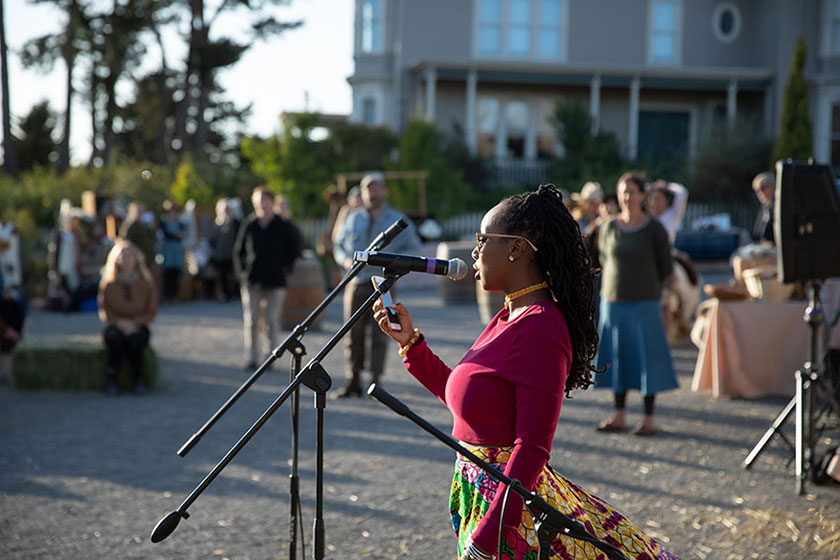
Teju Adisa-Farrar is a Jamaican-American writer, geographer and poet, and she created this original poem for The Practice of Belonging.
In/Visible Hands
by Teju Adisa-Farrar
I was told it was invisible hands
Pushing needles through fibers picked by humans
whose lives were and are seen as disposable
Pulling the thread towards liberation
Hoping to stitch a better future for their children
Not the children who will perish in the same position as them
But their children’s children’s children
who will hopefully emerge wounded, but free from this current system
Cotton is not innocent,
and neither is fashion
We are extracting resources, labor and culture
Oil permanently soaking the underside of fingernails that will never
consume even 1/10th of the products their work produces
The world is infinite, but we are not
In fact, we are very finite creatures
Living only seconds from our mere destruction
But for Black life, the reality of premature death has always been apart of our consciousness
See, 200 years ago we were picking sugar, coffee, and cotton
Now Black bodies drown crossing the Mediterranean and the ocean
This extraction has caused patterns of migration
that are far older than your vintage denim
In prison, they make our license plates and used to make the sneakers called Jordans
While Michael Jordan is making multi-millions, Jordan’s were made in prisons
by boys, now men, who probably waited in line to buy those same shoes to feel a sense of value
they thought the sneakers would make them feel important
When your life is not valued, you look for value in consumption
I read it was invisible hands who allowed me to lead the life I live
But these people are not invisible, they are overlooked
we, the people, the least evolved species on this planet
taking up more space then we can honor in this moment
we have an opportunity to refashion our existence
I mean redistribute our ignorance into resilience
I mean reimagine sustainable futures, expand our consciousness
I mean, we, the people, are only a few steps away from liberation
We, the people, here and now can wipe the tears of the next generation
If only we realize that the earth has been here,
we are just a tiny instant in the universe
It’s humbling
From the cliffs of privilege
it may seem like fashion is separate from violence
all of our consumption stems from the same system
but luckily, we can change this
we must grab these visible invisible hands, not hiding
but working in plain sight
we must grab hold of each other, not dominating
but working collectively towards freedom
we are not each other’s enemies or rivals
we are each other, literally, and there is
No separate survival
As we walk through this world
Clothed in the tethers of society
We must remember that every single fiber
is connected to a lineage and a story
my ancestors all across the Americas
from the Southern United States to Jamaica
picked, labored, and toiled the soil
So that I, and you and you and you – can live in a global world
and have important intellectual feelings
So now I, and you and you and you – have to honor their presence
and their wisdom
with our choices and the fight towards freedom
I am cut from a different cloth
a quilt of resistance
made colorful by the plants naturally growing from the dirt
I am the hemp seed 10,000 years ago
I am because they were
I am because we are
From the minerals in the loam to the threads in my clothes,
together we can lead the way like Harriet Tubman did with the North Star
Only together.
Dancing Earth
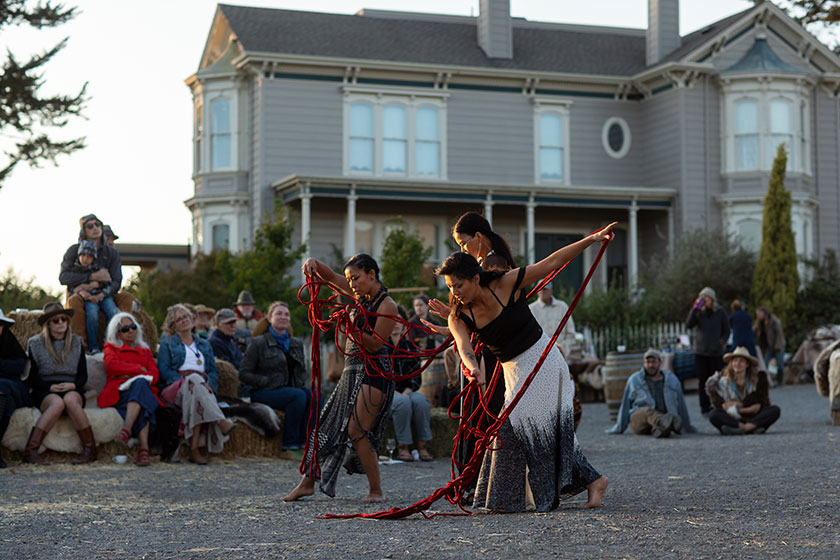
“Dancing Earth Indigenous Contemporary Dance Theater has been honored with invitations around the world, to interpret cultural-ecological themes important to intergenerational community leaders. We are honored to bring our dances to Pomo lands, in celebration of the powerful regenerative vision of Fibershed. This evening we share with you a series of dance solos that reflect the lives of these women, including a Navajo daughter of shepherding weavers, five generations of Apache basket weavers, rain in the desert, reclaiming corn ceremony, and the sacred web of life. Thank you for letting us share this collective experience which returns dance to the center of new rituals for transformation!”
Marketplace Partners
Artisanal goods, grown and made within the Northern California Fibershed. Find regionally grown and crafted goods and garments online any time, directly from members of the producer-owned Northern California Fibershed Cooperative at FibershedMarketplace.com.

Music, Food & Drink
Guests were graced with vocals by members of Kitka, the nine-woman Oakland ensemble that has developed a vast, breathtaking repertoire of traditional songs from the Balkans, Caucasus and Slavic lands over four decades.
Toes were tapping when Rebecca Richman (fiddle) and Connor Maguire (guitar) took the stage to play a unique blend of traditional fiddle music from the Celtic and American old-time musical traditions.

From the Dairies
Cheeses from Achadinha Cheese Co., Petaluma; as well as cheeses generously provided by Cowgirl Creamery: Point Reyes Original Blue by Point Reyes Farmstead Cheese Company; Halo by Moonside Creamery, Sebastopol; Mezzo Secco by Vella Cheese Company, Sonoma; Kenne by Tomales Farmstead Creamery — served with breads from M&H Bread and Butter, San Anselmo
From the Croplands
A banquet of dishes prepared by Isa Jacoby and Friends, with produce from Oakhill Farm, Paul’s Produce and Phoenix Family Farm, all in Sonoma, and Little Moon Farm in Napa; apples and pears from Chileno Valley Ranch
From the Pastures
Beef from Chileno Valley Ranch; lamb and other pasture dishes raised and prepared by Guido Frosini and True Grass Farms
Beverages
Wines sourced from wineries integrating sheep in their vineyards: Frey Vineyards, Littorai, Preston Farm & Winery; beer from HenHouse Brewing Company; kombucha from Revive Kombucha; tea from Numi Organic Tea
Gathering Areas
Guests cultivated skills and a sense of place with hands-on creative experiences taught by natural dye experts, fiber artists, and community facilitators. Learn more about the gathering area workshop leaders and practices by scrolling down below the Gathering Area photos.
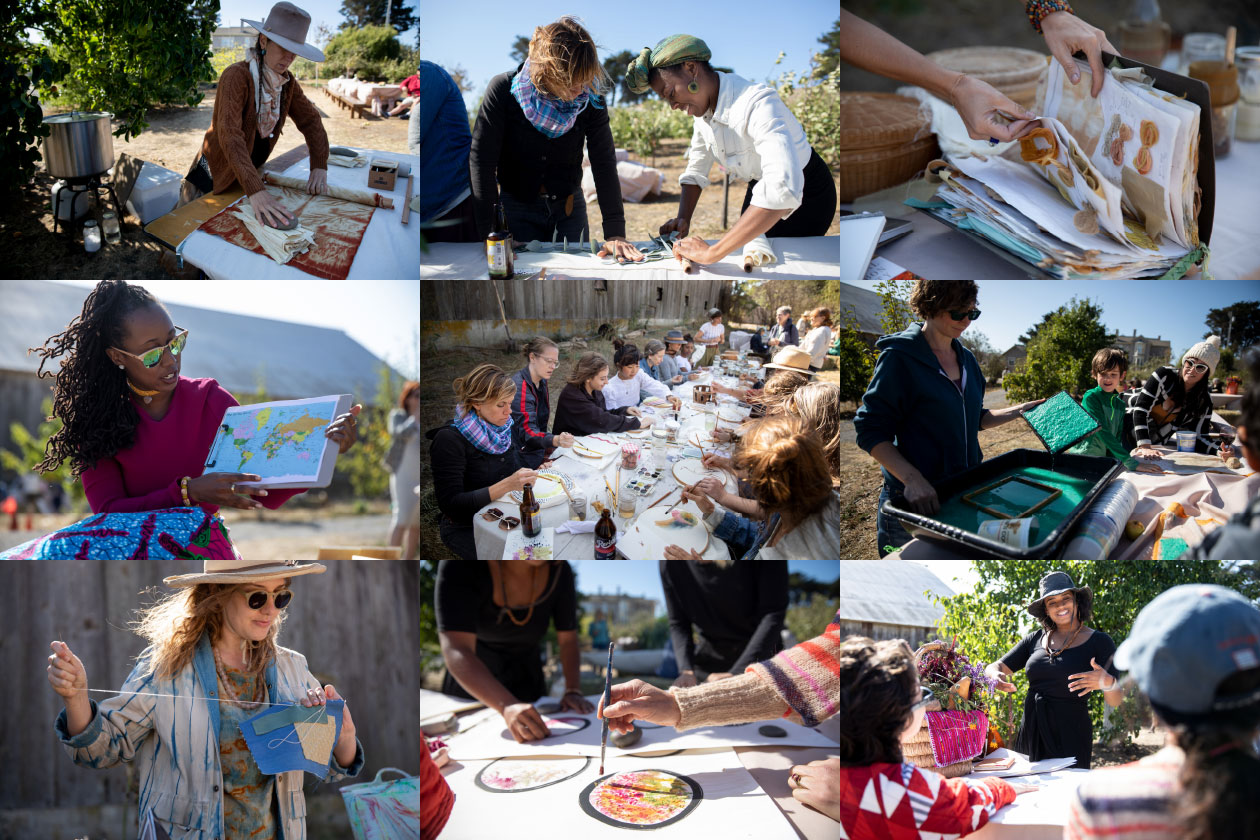
Eco Printing: Expressing Place on Climate Beneficial Wool
With Cory Gunter Brown
The practice: learn to work with wild harvested plant materials in a beautiful, expressive, and ethical way: eco printing is a sensuous dye technique true to its name. It is both environmentally friendly and works like a dye print in which the image and energy of the dye plants are transferred directly to the textile. We’ll use this magical technique to make living textiles that have personal meaning and are deeply connected to the places we call home.
Take home: an eco printed Climate Beneficial Wool textile to adorn your home or complement your wardrobe.
Artist bio: Cory Gunter Brown is an artisan and empath who has practiced the entwined arts of sacred adornment and the handmade her whole life. She was born and raised in East Oakland and comes from a radical and creative family of dancers, machinists, artists, and activists. Cory has learned the most powerful and beautiful truths in her life by listening to the voice of the Earth, the voices of Indigenous Peoples present and past, and her own inner voice. Through a decolonial lens, her work with natural dyes, and her relationship with the living Earth, she’s come to understand that for every toxic, abusive reality happening on this Earth, there is another way that is far more compassionate, elegant, and balanced within the cycle of life. She’s learned that our bodies are an extension of the Earth and the Earth is an extension of our bodies, and her choices in life now flow from that knowing. Cory spent ten years co-creating The Moon, an Oakland based feminine clothing line made by local hands with natural fibers and natural dyes. She is now teaching natural dye workshops to adults and children, producing a select few naturally dyed items each month, and making plant infused body oils in collaboration with the plant beings from the land where she lives in Mendocino. Working with plants has changed her life.
Growing Natural Dyes in Handmade Paper Vessels
With Michelle Wilson
The practice: engage with plant-based materials drawn from our regional ecosystem, sculpting paper made of invasive plants into a compostable container that invites you to explore how growing natural dye plants deepens your relationship to a place-based natural fiber and dye geography. This gathering area involves casting paper fibers into a form, a water-based process that does not require prior experience and will result in participants taking home wet work to dry — please wear clothing and shoes that can get wet.
Take home: a handmade, biodegradable paper vessel crafted from invasive species, plus dye garden seeds to cultivate local color at home, whether that’s on your doorstep or planted directly into the soil of your garden
Artist bio: Michelle Wilson is an interdisciplinary thinker whose work involves papermaking, printmaking, book arts, installation, and social practice. She has exhibited her work both internationally and in the United States, and her practice includes frequent collaborations with other artists, in particular her ongoing project the Rhinoceros Project with Anne Beck, which creates space for conversations around loss, extinction, and revitalization through community-based stitching and limited edition prints.
Mapping Clothing Toward Collective Accountability
With Teju Adisa-Farrar
The Practice: The majority of the clothing we have access to in the United States is imported from opaque supply chains and made by hands and labor often obscured to the point of invisibility. In this workshop we will map where our clothes come from and explore the geographies of collective accountability.
Take home: processes and tools for tracing the connections of material culture and responsibility
Artist bio: Teju Adisa-Farrar is a Jamaican-American writer, poet and urban geographer based in Oakland, California. Her focus is on environmental and cultural equity from a social geographies perspective. Having lived in 7 different countries, Teju has been involved in advocacy and human rights domestically and abroad for over a decade working on issues spanning political, racial and environmental justice. Her super power is connecting the dots between issues, globally. Teju supports artists, activists, initiatives, organizations and subaltern communities who are mapping/making alternative resilient futures.
Painting Clothes with Local Plants and Dye Extracts
With Liz Spencer
The practice: using local plants and natural extracts, explore the direct application of paint onto cloth. Proper methods for achieving wash and light fast results with natural dyes will be demonstrated, as well as tips for paint techniques using natural thickeners. Experience the whole process from plant to painted composition. This technique is aptly suited for masking stains or dinginess on well loved garments and linens and is capable of breathing new natural color beauty back into old textile items. No previous dyeing knowledge necessary.
Take home: naturally painted textiles, an original painting composition on paper and a handout outlining natural dye painting techniques and recipes to recreate this beautiful art at home.
Artist bio: Liz Spencer, also known as The Dogwood Dyer, has years of experience foraging, growing & processing plants for dye in both urban and rural locations. Her most recent experience of tending a dye garden nestled between rows of her family’s heritage orange grove in California on the cusp of an ever sprawling human population has taught her much about water conservation, waste stream tapping and how to push her craft in a more sustainable and environmentally sound manner. She holds a Master of Arts from the world’s leading sustainable fashion graduate program ‘Fashion Futures’ at the London College of Fashion where she discovered natural dyeing. She has taught fashion, sustainability, and natural dyeing at Parsons the New School and continually teaches at the Fashion Institute of Technology. She was a venture fellow at the Brooklyn Fashion and Design Accelerator (BF+DA) and now splits her time each year teaching between California and New York with the ambition to increase sustainable literacy & practices in the fashion and textiles industries. She is now finding a new rhythm by the ocean in San Clemente, CA with her partner and two children.
Reflecting Place on Paper with a Local Color Palette
With Grace Haris
The practice: What would it look like to capture and transmute pigments onto fiber as a form of acknowledgement and appreciation? As stewards of the earth, we must ask ourselves to consider the sustainability of process and outcome in our art. In this workshop, we will experiment and discuss different ecologically-conscious natural dyeing techniques onto various types of fiber mediums. The fungi and native plants of Sonoma County will serve as our source of locally-derived inspiration. From this process, we will identify our favorite colors created and apply them on a 100% cotton letter-pressed poster depicting the palette of our dreams. In this workshop, the final form is not just the creation itself but the collective stories and gratitude uncovered in the process. Colors are a fundamental component of us and our shared experiences, stories, and memories. Each place, with their own ecologies emit a unique composition of light that gives evidence to life on earth.
Take home: one-of-a-kind artwork and skills applicable to any neighborhood or place, allowing us to reflect on the beauty and blessings of our diverse planet.
Artist bio: Grace Sullivan is an environmental educator and natural textile dyer born in the desert of Arizona. She holds a diverse background in environmental studies and sustainability, which she weaves with her love of creative expression to advocate for harmonic interactions between our earth, ourselves, and each other. Grace is passionate about rediscovering relationships with the land and sea in cooperation with communities advocating for stabilization and environmental justice. She loves farming flowers, dancing, and the deep stories embedded within. She currently resides in Oakland, California at PLACE for Sustainable Living and can be found online at graceharis.com.
Visible Mending: Layering Local Fibers onto Loved Clothes
With Ashley Eva Brock
The Practice: Rather than hiding damage and repair, the visible act of care and dedication for the life and longevity of the object adds to its beauty: in this workshop, we’ll be exploring this concept to mend our clothes. Patches of botanically dyed Huston Textile denim fabric, embroidery needles and thread including Climate Beneficial Wool fine yarns will be provided to practice mending stitches and techniques.
Take home: tactile skills and samples of visible mending stitches to create mended textiles
Artist bio: Ashley Eva Brock is a fashion and costume designer, fiber artist, and educator. Her work focuses on natural fibers, natural dyes, and experimental, conceptual approaches to both wearable and non-wearable objects. She holds a degree from the California College of the Arts in Fashion Design with a strong focus on Textile Fine Arts. She interweaves fine art and fashion, functionality and form, practicality and possibility. She has shown her wall-based work at places such as Tartine Bakery in San Francisco and in publications such as the West Marin Review. Her body-based work has received several awards including The London Centre for Sustainable Fashion’s Fashioning the Future Award in 2011. She has worked as a dyer at the San Francisco Opera, for clothing design companies such as Tea Collection and Gravel & Gold, and is a freelance costume designer for music videos, performance and film. She teaches at her alma mater CCA, as well as public workshops on subjects including natural dyes, costume design, and sewing/patternmaking.
Sponsors
Chileno Valley Ranch • True Grass Farms
Frey Vineyards • HenHouse Brewing Company • Littorai • Numi Organic Tea • Preston Farm & Winery
Event Planning by Andrea Plell, Ecologique Fashion • Photos by Paige Green • Illustration by Nicholas Olmsted
